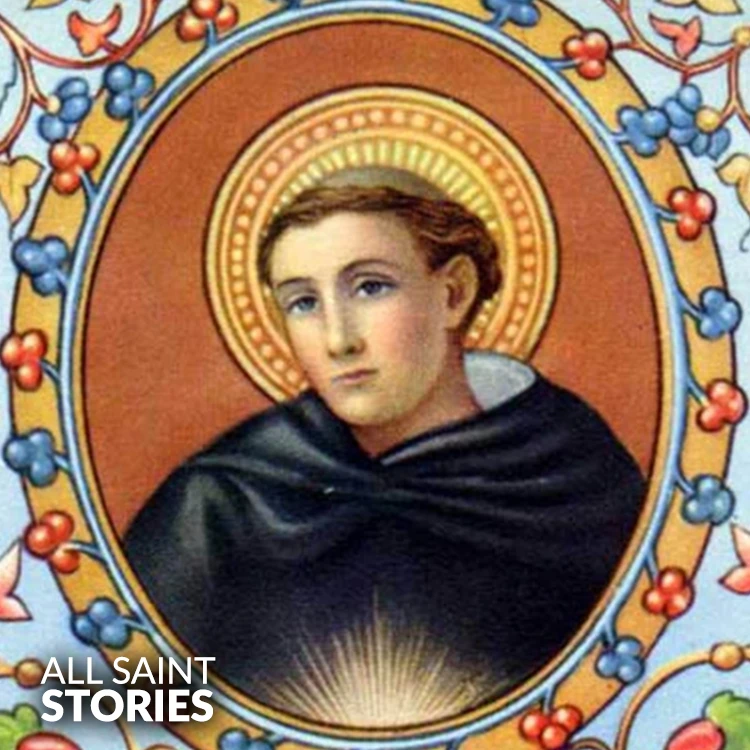"Saint Nicholas of Tolentino, faithful servant of God, intercede for us in our time of need. Help us grow in holiness, patience, and charity, and guide us toward the peace of Christ. May your prayers bring us closer to God’s love and grace. Amen."
ST. NICHOLAS OF TOLENTINO
ST. NICHOLAS OF TOLENTINO

St. Nicholas of Tolentino was an Augustinian friar known for his deep piety, fasting, and devotion to the souls in purgatory. He performed numerous miracles, including healings and visions, and was widely regarded as a holy man during his lifetime. His incorrupt body and miracles after death led to his canonization in 1446.
St. Nicholas of Tolentino was born in 1245 in Sant'Angelo, Italy, to parents who had long prayed for a child. Their prayers were answered, and they dedicated Nicholas to God from a young age. Inspired by a sermon on St. Augustine, Nicholas joined the Augustinian order at the age of 18. He devoted himself to a life of prayer, humility, and service to the poor.
After becoming a priest, Nicholas was assigned to Tolentino, where he spent nearly 30 years preaching, hearing confessions, and ministering to the sick and needy. He was known for his extreme fasting and personal sacrifices. He often ate only bread and water, slept on the floor, and spent long hours in prayer. He was especially devoted to the souls in purgatory and had several mystical visions in which souls appeared to him, asking for his prayers.
Numerous miracles were attributed to him, both during his life and after his death. He was known for healing the sick, restoring sight to the blind, and even bringing a child back to life. One of his most famous miracles involved blessed bread, which he gave to the sick, leading to many miraculous healings.
St. Nicholas passed away on September 10, 1305. After his death, his body was found to be incorrupt, a sign of holiness in Catholic tradition. Pilgrims flocked to his tomb, and numerous miracles were reported through his intercession. His incorrupt body remained preserved for centuries and is venerated at the Basilica of St. Nicholas in Tolentino, Italy.
Video Not Found
The information on this website is compiled from various trusted sources. While we aim for accuracy, some details may be incomplete or contain discrepancies.
If you notice any errors or have additional information about this saint, please use the form on the left to share your suggestions. Your input helps us improve and maintain reliable content for everyone.
All submissions are reviewed carefully, and your personal details will remain confidential. Thank you for contributing to the accuracy and value of this resource.
Credits & Acknowledgments
- Anudina Visudhar (Malayalam) – Life of Saints for Everyday
by Msgr. Thomas Moothedan, M.A., D.D. - Saint Companions for Each Day
by A. J. M. Mausolfe & J. K. Mausolfe - US Catholic (Faith in Real Life) – Informational articles
- Wikipedia – General reference content and images
- Anastpaul.com – Saint images and reflections
- Pravachaka Sabdam (Malayalam) – Saint-related content and insights
We sincerely thank these authors and platforms for their valuable contributions. If we have unintentionally missed any attribution, please notify us, and we will make the correction promptly.
If you have any suggestion about ST. NICHOLAS OF TOLENTINO
Your suggestion will help improve the information about this saint. Your details will not be disclosed anywhere.
© 2026 Copyright @ www.allsaintstories.com




 English
English
 Italian
Italian
 French
French
 Spanish
Spanish
 Malayalam
Malayalam
 Russian
Russian
 Korean
Korean
 Sinhala
Sinhala
 Japanese
Japanese
 Arabic
Arabic
 Portuguese
Portuguese
 Bantu
Bantu
 Greek
Greek
 German
German
 Dutch
Dutch
 Filipino
Filipino